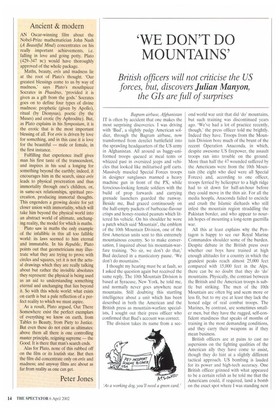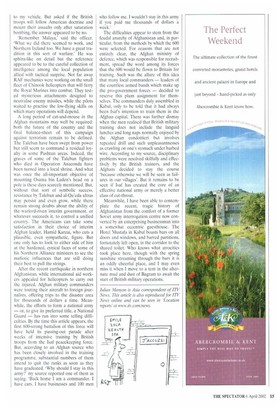WE DON'T DO MOUNTAINS'
British officers will not criticise the US
forces, but, discovers Julian Manyon,
the GIs are full of surprises
Bagram airbase, Afghanistan IT is often by accident that one makes the most surprising discoveries. I was driving with 'Bud', a slightly pudgy American soldier, through the Bagram airbase, now transformed from derelict battlefield into the sprawling headquarters of the US army in Afghanistan. All around us baggy-uniformed troops queued at meal tents or whizzed past in oversized jeeps and vehicles that looked like militarised golf carts. Massively muscled Special Forces troops in designer sunglasses manned a heavy machine gun in front of the PX, while ferocious-looking female soldiers with the build of prop forwards and carrying grenade launchers guarded the runway. Beside me, Bud grazed continuously on the half-empty packets of barbecue-flavour crisps and honey-roasted peanuts which littered his vehicle. On his shoulder he wore a patch which said 'Mountain', the emblem of the 10th Mountain Division, one of the first American units sent to this extremely mountainous country. So to make conversation, I inquired about his mountain-warfare training. 'No sir, we don't do that,' Bud declared in a masticatory pause. 'We don't do mountains.'
I thought my hearing must be at fault, so I asked the question again but received the same reply. The 10th Mountain Division is based at Syracuse, New York, he told me, and normally never goes anywhere near mountains. Still doubting this startling intelligence about a unit which has been described in both the American and the British press as mountain-warfare specialists, I sought out their press officer who confirmed that Bud's account was correct.
The division takes its name from a sec
ond world war unit that did `do' mountains, but such training was discontinued years ago. 'We've had a lot of practice recently, though,' the press officer told me brightly. Indeed they have. Troops from the Mountain Division bore much of the brunt of the recent Operation Anaconda, in which, despite awesome US firepower, the assault troops ran into trouble on the ground. More than half the 47 wounded suffered by the Americans were from the 10th Mountain (the eight who died were all Special Forces) and, according to one officer, troops ferried by helicopter to a high ridge had to sit down for half-an-hour before they could move in the thin air. For all the media hoopla, Anaconda failed to encircle and crush the Islamic diehards who still infest the mountain region straddling the Pakistan border, and who appear to nourish hopes of mounting a long-term guerrilla war.
All this at least explains why the Pentagon is happy to see our Royal Marine Commandos shoulder some of the burden. Despite debate in the British press over whether our boys have trained at high enough altitudes for a country in which the grandest peaks reach almost 25,000 feet compared with 15,000 feet in the Alps, there can be no doubt that they do `do' mountains. Physically, the contrast between the British and the American troops is subtle but striking. The men of the 10th Mountain are often big and seem more or less fit, but to my eye at least they lack the honed edge of real combat troops. The Marines, by contrast, are sometimes smaller men, but they have the rugged, self-confident sturdiness that speaks of months of training in the most demanding conditions, and they carry their weapons as if they mean business.
British officers are at pains to cast no aspersions on the fighting qualities of the American ally they have come to assist, though they do hint at a slightly different tactical approach. US bombing is lauded for its power and high-tech accuracy. One British officer grinned with what appeared to be a certain relish as he told me that the Americans could, if required, land a bomb on the exact spot where I was standing next
to my vehicle. But asked if the British troops will follow American doctrine and mount their assaults only after saturation bombing, the answer appeared to be no.
'Remember Malaya,' said the officer. 'What we did there seemed to work, and Northern Ireland too. We have a great tradition in this sort of warfare.' He was sphinx-like on detail but the reference appeared to be to the careful collection of intelligence among the local population allied with tactical surprise. Not far away RAF mechanics were working on the small fleet of Chinook helicopters that will ferry the Royal Marines into combat. They tested mysterious attachments designed to neutralise enemy missiles, while the pilots waited to practise the low-flying skills on which many operations will depend.
A long period of cat-and-mouse in the Afghan mountains may well be required: both the future of the country and the final balance-sheet of this campaign against terrorism remain to be defined. The Taleban have been swept from power but still seem to command a residual loyalty in some Pushtun areas. Indeed, the graves of some of the Taleban fighters who died in Operation Anaconda have been turned into a local shrine. And what was once the all-important objective of mounting Osama bin Laden's head on a pole is these days scarcely mentioned. But, without that sort of symbolic success, resistance by Taleban and al-Qa'eda ultras may persist and even grow, while there remain strong doubts about the ability of the warlord-riven interim government, or whatever succeeds it, to control a unified country. The Americans can take some satisfaction in their choice of interim Afghan leader, Hamid Karzai, who cuts a plausible, even sympathetic, figure. But one only has to look to either side of him at the hardened, cynical faces of some of his Northern Alliance ministers to see the mafiotic influences that are still doing their best to pull the strings.
After the recent earthquake in northern Afghanistan, while international aid workers appealed for helicopters to carry out the injured, Afghan military commanders were touting their aircraft to foreign journalists, offering trips to the disaster area for thousands of dollars a time. Meanwhile, the efforts to form a national army — or, to give its preferred title, a National Guard — has run into some telling difficulties. By the time this article appears, the first 600-strong battalion of this force will have held its passing-out parade after weeks of intensive training by British troops from the Isaf peacekeeping force. But, according to an Afghan source who has been closely involved in the training programme, substantial numbers of them intend to quit the ranks as soon as they have graduated. 'Why should I stay in this army?' my source reported one of them as saying. 'Back home I am a commander. I have cars, I have businesses and 100 men who follow me. I wouldn't stay in this army if you paid me thousands of dollars a week.'
The difficulties appear to stem from the feudal anarchy of Afghanistan and, in particular, from the methods by which the 600 were selected. For reasons that are not entirely clear, the Afghan ministry of defence, which was responsible for recruitment, spread the word among its forces that the 600 would be flown to Britain for training. Such was the allure of this idea that many local commanders — leaders of the countless armed bands which make up the pro-government forces — decided to reserve this plum assignment for themselves. The commanders duly assembled in Kabul, only to be told that it had always been Isafs intention to train them in the Afghan capital. There was further dismay when the men realised that British military training does not include the languid lunches and long naps normally enjoyed by the Afghan condottieri but involves repeated drill and such unpleasantnesses as crawling on one's stomach under barbed wire. According to my source, disciplinary problems were resolved skilfully and effectively by the British trainers, and the Afghans decided to stay the course 'because otherwise we will be seen as failures in our villages'. But it remains to be seen if Isaf has created the core of an effective national army or merely a better class of cut-throat.
Meanwhile. I have been able to contemplate the recent, tragic history of Afghanistan from the comfort of a former Soviet army interrogation centre now converted by an enterprising businessman into a somewhat eccentric guesthouse. The Hotel Mustafa in Kabul boasts bars on all doors and windows, and barred partitions, fortunately left open, in the corridor to the shared toilet. Who knows what atrocities took place here, though with the spring sunshine streaming through the bars it is an oddly cheerful place, and I may even miss it when I move to a tent in the alternate mud and dust of Bagram to await the start of British military operations.
Julian Alanyon is Asia correspondent of ITV News. This article is also reproduced for ITV News online and can be seen in 'Location reports' at wwwitv.cominews.































































 Previous page
Previous page